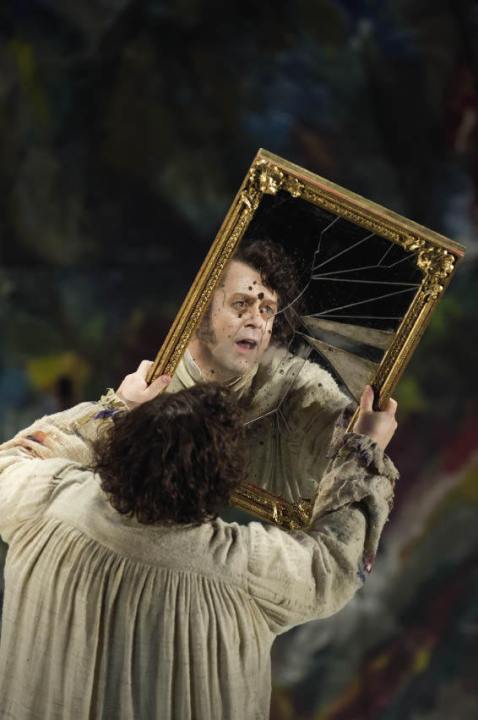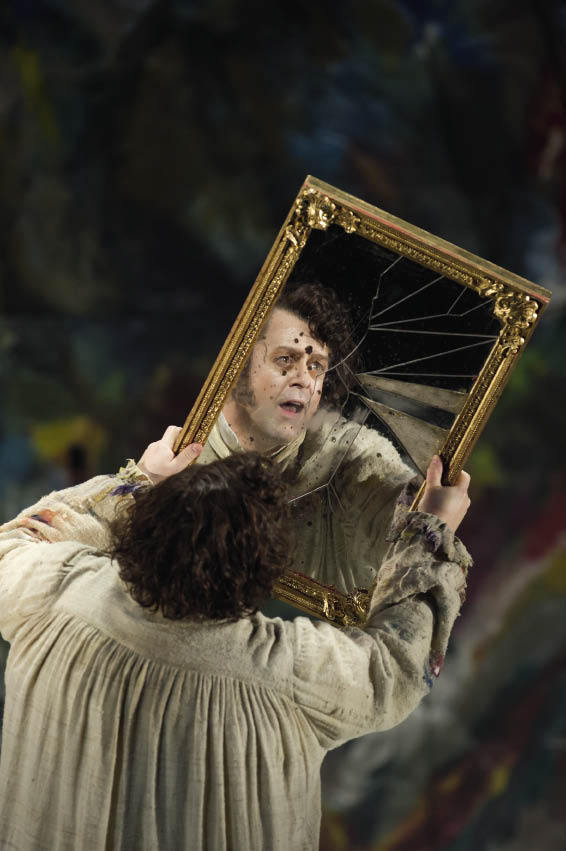Artistic integrity is the subject of Mieczysław Weinberg’s opera The Portrait, as it is of Gogol’s short story from which it is adapted.
Artistic integrity is the subject of Mieczysław Weinberg’s opera The Portrait, as it is of Gogol’s short story from which it is adapted. And whatever one might feel about the work — and I enjoyed it a lot more than most of my colleagues seem to have — Opera North is unquestionably demonstrating artistic integrity by staging relatively or very unknown operas in productions which don’t have as their main selling point that the director has never seen, let alone directed, an opera before.
On the contrary, Opera North goes for the most experienced directors they can get, in this case David Pountney, who is not only responsible for the production, but is also doing all he can for Weinberg’s work, and, together with Anastasia Koshkina, translated the libretto into English (the opera is also surtitled much of the time, which seems to indicate that Pountney is a late convert to the practice of which he was the leading opponent for many years; or that Opera North did it over his prostrate body).
Gogol has been the inspiration for a prodigious number of Slav composers, which is not surprising in one way, since his tales often include highly colourful characters and episodes, which seem to be crying out for extravagant theatrical treatment. On the other hand, Gogol’s tone is one that it is almost impossible to catch in an operatic treatment, so that his stories often come across more vividly on the page than on the stage, even when set by Tchaikovsky or Rimsky or Shostakovich.
And The Portrait, one of his masterworks, though less famous than many of his tales, has a complexity and subtlety of approach to its subject which is simply untranslatable into another medium. You might say that that hardly matters, since Alexander Medvedev, who wrote the libretto, produced an independent text which only took Gogol as its inspiration. But my impression from having encountered the opera only once so far is that it would hardly make sense if one didn’t have the tale fresh in one’s mind; but that if one does have, the inadequacies of the adaptation are all too apparent. And Weinberg’s music, though it has merits, is not of the kind that can characterise with a single memorable phrase, though that is sometimes what it wants to do.
So while Gogol’s tale, like most things he wrote, is alarmingly alive with vivid figures, however small their part in the plot, and almost gives one the feeling of entering into an hallucination, Weinberg’s opera, though it quotes liberally from the tale, remains stubbornly two-dimensional, despite a lively production and despite being extraordinarily well cast.
The hero of the evening was, is, Paul Nilon. He is a unique phenomenon on the operatic scene. He has been taking long, difficult, wildly diverse roles over decades and bringing them to the most vivid life that the work concerned and its production allow. Who can forget his Ulisse, his Idomeneo, his Pylade, or his matchless Handel performances?
In The Portrait he plays an aspiring impoverished artist, Chartkov, who betrays his gift thanks to the seductions of celebrity and wealth, and ends up in a humiliated heap, first insane and finally dead, after being presented with the work of another artist, one who has sacrificed everything but his integrity, and has therefore been able to produce a pure masterpiece. That is more or less the whole of the opera; but it is only part of the story, which not only continues to brilliant effect after Chartkov’s death, but also is an uneasy questioning of the nature and power of works of art.
The portrait which gives the tale its name is notable for the terrifying eyes, which exert a dire influence on successive owners. In this production of the opera, perhaps too — I don’t know — in an instruction in the text of the opera, the portrait, which claims Chartkov as its first victim, is a mirror. That sounds like a clever idea, but actually it isn’t intelligible.
And Chartkov is reduced, I suppose, to a Warhol figure, who churns out portraits of Stalin the avuncular, but with lightbulbs as eyes. But that is to introduce a subject which is wholly external to the Gogol story, and to a serious investigation of Chartkov’s self-betrayal. For the capitulation of artists under tyranny is both too banal and too painful a matter to be introduced at a late stage in a fantastic opera. Chartkov is not a charlatan like the names listed in the programme, the kind of people who win Turner prizes. He is capable of great work, and is destroyed by his recognition of someone else not only being capable of creating great work, but also actually making the sacrifices that that requires.
Weinberg’s mainly bland, largely anonymous, agreeably fluent music hardly does anything to shed light on this momentous topic, so the sense one gets that there is a lot of potential which has been wasted is almost entirely the result of the impressive production and the very fine musical realisation.







Comments